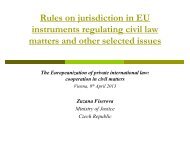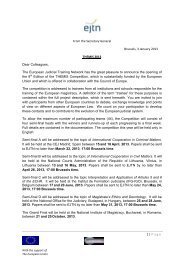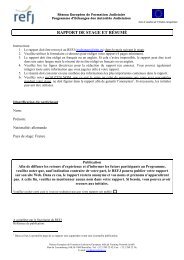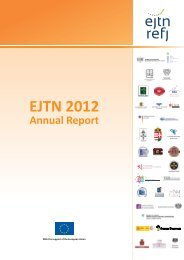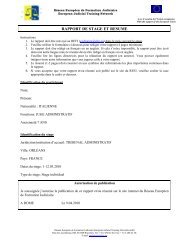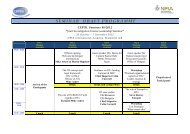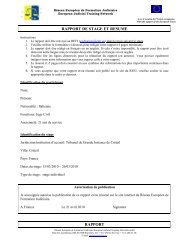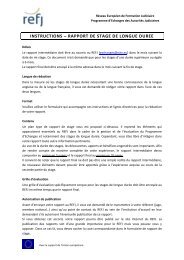Management and leadership - EJTN
Management and leadership - EJTN
Management and leadership - EJTN
- No tags were found...
Create successful ePaper yourself
Turn your PDF publications into a flip-book with our unique Google optimized e-Paper software.
Training of TrainersTrier 9-10.7.2013Court <strong>and</strong> Prosecutors Office<strong>Management</strong> <strong>and</strong> LeadershipJorma HirvonenMinistry of JusticeFinl<strong>and</strong>
Background theories of <strong>Management</strong>• Organisation theories• Essentials in relation to management <strong>and</strong> <strong>leadership</strong>• Human approaches• Leadership styles• Contingency models of management• Implementations of <strong>Management</strong> by Results• How to teach <strong>Management</strong> <strong>and</strong> Leadership• Managerial Competencies, responsibilities• Training programs: for whom <strong>and</strong> what kind of trainingJorma HirvonenMinistry of JusticeFinl<strong>and</strong>
<strong>Management</strong> <strong>and</strong> <strong>leadership</strong>concepts• <strong>Management</strong> can be defined byinfluencing people or groups to acttowards a common goal of theorganisation.• Leadership is a process of interaction withpeople to get them motivated to acttowards these common goals.Jorma HirvonenMinistry of JusticeFinl<strong>and</strong>
Theories of management <strong>and</strong><strong>leadership</strong>• Focus on tasks <strong>and</strong>organisation• Scientific management(Taylor)• Bureaucracy (Weber)• Administrative shool(Simon)• Organisation school(Minzberg)• Contingency theory,Systems theory• New Public <strong>Management</strong>• Focus on people• Human relations (Lewin)• Organisation Development(OD)• Contingency theory/Situational <strong>leadership</strong>• Systems theory• Value management• Change management (Lewin,Burns)• Leadership stylesJorma HirvonenMinistry of JusticeFinl<strong>and</strong>
Scientific <strong>Management</strong> (Taylor)• Focus on planning <strong>and</strong> organizing• ”Right man on the right place”• Thinking <strong>and</strong> doing separated• From Up – to Down thinking• Control• Task oriented•Authoritarian <strong>leadership</strong>Jorma HirvonenMinistry of JusticeFinl<strong>and</strong>
Bureaucracy (Weber)• Societal theory• Formal organisation• Max Webers ideal model• Complete planning of organisation• Hierarchy• Loyalty• Regulations• Task oriented, non personal• Authoritarian <strong>leadership</strong> styleJorma HirvonenMinistry of JusticeFinl<strong>and</strong>
Administrative school (Simon)Organisation school (Minzberg)• Decision – making processes, organisation structures,models• Best possible decisions <strong>and</strong> solutions• Rationality, limited rationality• Planning, Decision – making• Structure definitions (division of work, specialisation,authority, power, centralisation, decentralisation)• Task – oriented <strong>and</strong> technical approachesJorma HirvonenMinistry of JusticeFinl<strong>and</strong>
Court organisationLevels of managementAuthority/ Division of workDevelopment discussionsMeeting practisesDaily <strong>leadership</strong>Jorma HirvonenMinistry of JusticeFinl<strong>and</strong>
Human relations• Human based approach• Trait- <strong>and</strong> skills approach• Focus on <strong>leadership</strong> behavior• Motivation theories• Small groups theory (Lewin)• Organisation development (OD)• People (Human) oriented• Democratic <strong>leadership</strong>Jorma HirvonenMinistry of JusticeFinl<strong>and</strong>
Systems theory• Organisation as part of sub-systems <strong>and</strong> ininteraction with its environment• Organisation as a system; Goals,Structure, Personnel, Systems,<strong>Management</strong>• Focus on the organisation as a whole• Changes in sub-systems affects to othersub-systemsJorma HirvonenMinistry of JusticeFinl<strong>and</strong>
New Public Administration• Ownership• Productivity• Privatisation• Entrepeneurship• Costs• <strong>Management</strong> by results• Accountability• ControllingJorma HirvonenMinistry of JusticeFinl<strong>and</strong>
Leadership styles• Authoritarian – Democratic –Laisses Faire• Situational <strong>leadership</strong> (contingency model)• Combined models <strong>and</strong> managementprocessesJorma HirvonenMinistry of JusticeFinl<strong>and</strong>
Mac Gregor• Theory X: Negative wiev on people. Mostpeople do not like their work. They mustbe directed <strong>and</strong> controlled. They wantsafety above all <strong>and</strong> are not ambigious<strong>and</strong> not interested in assumingresponsibility.• Organisation: Up – down oriented, controllconcentrated, hierarchic, undemocraticathmosphire, autoritarian <strong>leadership</strong>.Jorma HirvonenMinistry of JusticeFinl<strong>and</strong>
Mc Gregor, theory Y• Assumptions: People are not, by nature; lazy<strong>and</strong> unreliable. Work is for people as natural asrest <strong>and</strong> play. People can be self-directed <strong>and</strong>creative at work, they should not be motivatedwith the treath of punishments <strong>and</strong> externalcontrol.• Organisation: Integration of company <strong>and</strong> owngoals. Good athmosphire, climat <strong>and</strong> sense ofmutual trust. Democratic <strong>leadership</strong>.Jorma HirvonenMinistry of JusticeFinl<strong>and</strong>
© Hersey & Blanchard (1977)Jorma HirvonenMinistry of JusticeFinl<strong>and</strong>
<strong>Management</strong> by Results• Vision, Goals• Strategic planning• Performance management• Development discussions, from organisation goals toindividual goals• Competence management• Individual development plans• Organisation of work, responsibilities• Daily <strong>leadership</strong>• Follow up• Regular meeting practiceJorma HirvonenMinistry of JusticeFinl<strong>and</strong>
About Court Mangement• <strong>Management</strong> of the Application of the Law• <strong>Management</strong> of the organisation <strong>and</strong> workingcommunity, personnel management• Leadership• Administration, budgetingJorma HirvonenMinistry of JusticeFinl<strong>and</strong>
Managerial competencies• Conceptual skills: Environmental, theoreticalknowledge, experiences• Technical skills: Methods, systems, practices• Human relation skills: Leadership skills,motivation, conflicts, working community, wellbeing at work, coping, climate, etcJorma HirvonenMinistry of JusticeFinl<strong>and</strong>
How to teach management ?• WHO: What is the target group ? Which levelleaders they are, what is the organisation theyrepresent ?• WHAT: What competencies they need ?• What goals to the training ?• What contents ?• HOW: Which methods to use?• The lenght of the training or training program ?• Expected results <strong>and</strong> evaluation
Work shop• For whom are we planning the training?• What goals we want to achieve ?• What we want to invest ?
Work shop• What are the main contents ?• What methods should be used to createlearning ?• How the training will be organised ?



